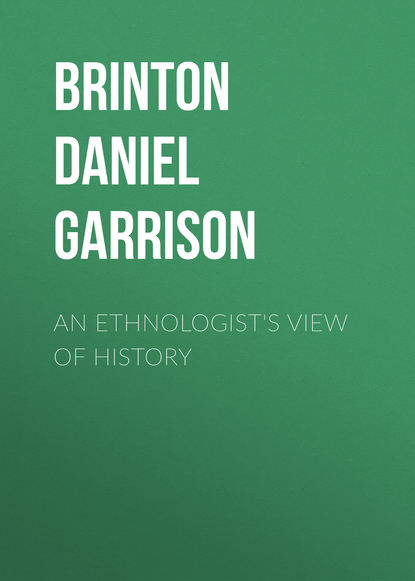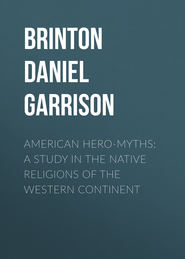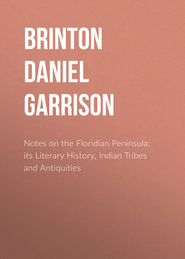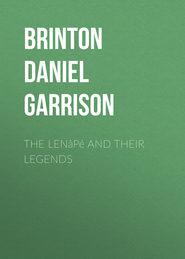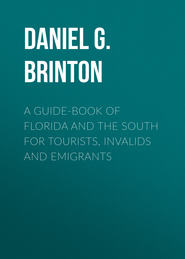По всем вопросам обращайтесь на: info@litportal.ru
(©) 2003-2024.
✖
An Ethnologist's View of History
Настройки чтения
Размер шрифта
Высота строк
Поля
Now men do not live in material things, but in mental states; and solely as they affect these are the material things valuable or valueless. Religions, arts, laws, historic events, all have but one standard of appraisement, to wit, the degree to which they produce permanently beneficial mental states in the individuals influenced by them. All must agree to this, though they may differ widely as to what such a mental state may be; whether one of pleasurable activity, or that of the Buddhist hermit who sinks into a trance by staring at his navel, or that of the Trappist monk whose occupations are the meditation of death and digging his own grave.
The ethnologist must make up his own mind about this, and with utmost care, for if his standard of merit and demerit is erroneous, his results, however much he labors on them, will have no permanent value. There are means, if he chooses to use them, which will aid him here.
He must endeavor to picture vividly to himself the mental condition which gave rise to special arts and institutions, or which these evolved in the people. He must ascertain whether they increased or diminished the joy of living, or stimulated the thirst for knowledge and the love of the true and the beautiful. He must cultivate the liveliness of imagination which will enable him to transport himself into the epoch and surroundings he is studying, and feel on himself, as it were, their peculiar influences. More than all, chief of all, he must have a broad, many-sided, tender sympathy with all things human, enabling him to appreciate the emotions and arguments of all parties and all peoples.
Such complete comprehension and spiritual accord will not weaken, but will strengthen his clear perception of those standards by which all actions and institutions must ultimately be weighed and measured. There are such standards, and the really learned ethnologist will be the last to deny or overlook them.
The saying of Goethe that “The most unnatural action is yet natural,” is a noble suggestion of tolerance; but human judgment can scarcely go to the length of Madame de Stael’s opinion, when she claims that “To understand all actions is to pardon all.” We must brush away the sophisms which insist that all standards are merely relative, and that time and place alone decide on right and wrong. Were that so, not only all morality, but all science and all knowledge were fluctuating as sand. But it is not so. The principles of Reason, Truth, Justice and Love have been, are, and ever will be the same. Time and place, race and culture, make no difference. Whenever a country is engaged in the diffusion of these immortal verities, whenever institutions are calculated to foster and extend them, that country, those institutions, take noble precedence over all others whose efforts are directed to lower aims.[15 - There is nothing in this inconsistent with the principle laid down by Lecky: “The men of each age must be judged by the ideal of their own age and country, and not by the ideal of ourselves.” —The Political Value of History, p. 50, New York, 1892. The distinction is that between the relative standard, which we apply to motives and persons, and the absolute standard, which we apply to actions. The effects of the latter, for good or evil, are fixed, and independent of the motives which prompt them.]
Something else remains. When the ethnologist has acquired a competent knowledge of his facts, and deduced from them a clear conception of the mental states of the peoples he is studying, he has not finished his labors. Institutions and arts in some degree reflect the mental conditions of a people, in some degree bring them about; but the underlying source of both is something still more immaterial and intangible, yet more potent, to wit, Ideas and Ideals. These are the primary impulses of conscious human endeavor, and it is vain to attempt to understand ethnology or to write history without assigning their consideration the first place in the narration.
I am anxious to avoid here any metaphysical obscurity. My assertion is, that the chief impulses of nations and peoples are abstract ideas and ideals, unreal and unrealizable; and that it is in pursuit of these that the great as well as the small movements on the arena of national life and on the stage of history have taken place.
You are doubtless aware that this is no new discovery of mine. Early in this century Wilhelm von Humboldt wrote: “The last and highest duty of the historian is to portray the effort of the Idea to attain realization in fact;” and the most recent lecture on the philosophy of history which I have read, that by Lord Acton, contains this maxim: “Ideas which in religion and politics are truths, in history are living forces.”
I do claim that it is timely for me to repeat these doctrines and to urge them with vehemence, for they are generally repudiated by the prevailing schools of ethnology and history in favor of the opinion that objective, mechanical influences alone suffice to explain all the phenomena of human life. This I pronounce an inadequate and an unscientific opinion.
There is in living matter everywhere something which escapes the most exhaustive investigation, some subtle center of impulse, which lies beyond the domain of correlated energy, and which acts directively, without increasing or diminishing the total of that energy. Also in the transformations of organic forms, there are preparations and propulsions which no known doctrine of the mechanical, natural causes can interpret. We must accept the presence of the same powers, and in a greater degree, in the life and the history of man.[16 - “The historian,” says Tolstoi, “is obliged to admit an inexplicable force, which acts upon his elementary forces.” Power and Liberty, p. 28 (Eng. Trans., New York, 1888).]
It may be objected that abstract ideas are far beyond the grasp of the uncultivated intellect. The reply is, consciously to regard them as abstract, may be; but they exist and act for all that. All sane people think and talk according to certain abstract laws of grammar and logic; and they act in similar unconsciousness of the abstractions which impel them. Moreover, the Idea is usually clothed in a concrete Ideal, a personification, which brings it home to the simplest mind. This was long ago pointed out by the observant Machiavelli in his statement that every reform of a government or religion is in the popular mind personified as the effort of one individual.
In every nation or ethnos there is a prevailing opinion as to what the highest typical human being should be. This “Ideal of Humanity,” as it has been called, is more or less constantly and consciously pursued, and becomes a spur to national action and to a considerable degree an arbiter of national destiny. If the ideal is low and bestial, the course of that nation is downward, self-destroying; if it is lofty and pure, the energies of the people are directed toward the maintenance of those principles which are elevating and preservative. These are not mechanical forces, in any rational sense of the term; but they are forces the potent directive and formative influence of which cannot be denied and must not be underestimated.
Just in proportion as such ideas are numerous, clear and true in the national mind, do their power augment and their domain extend; just so much more quickly and firmly do they express themselves, in acts, forms and institutions, and thus enable the nation to enrich, beautify and strengthen its own existence. We have but to glance along the nations of the world and to reflect on the outlines of their histories, to perceive the correctness of the conclusion which Prof. Lazarus, perhaps the most eminent analyst of ethnic character of this generation, reaches in one of his essays: “A people which is not rich in ideas, is never rich; one that is not strong in its thinking powers, is never strong.”[17 - See his article “Ueber die Ideen in der Geschichte,” in the Zeitschrift für Völkerpsychologie. Bd. III., S. 486.]
I claim, therefore, that the facts of ethnology and the study of racial psychology justify me in formulating this maxim for the guidance of the historian: The conscious and deliberate pursuit of ideal aims is the highest causality in human history.
The historian who would fulfil his mission in its amplest sense must trace his facts back to the ideas which gave them birth; he must recognize and define these as the properties of specific peoples; and he must estimate their worth by their tendency to national preservation or national destruction.
This is the maxim, the axiom, if you please, which both the ethnologist and the historian must bear ever present in mind if they would comprehend the meaning of institutions or the significance of events. They must be referred to, and explained by, the ideas which gave them birth. As an American historian has tersely put it, “The facts relating to successive phases of human thought constitute History.”[18 - Brooks Adams, The Law of Civilization and Decay, Preface (London, 1895). This author has reached an advanced position with reference to thought and emotion as the impulses of humanity.]
I am aware that a strong school of modern philosophers will present the objection that thought itself is but a necessary result of chemical and mechanical laws, and therefore that it cannot be an independent cause. Dr. Post has pointedly expressed this position in the words: “We do not think; thinking goes on within us,”[19 - Grundriss der ethnologischen Jurisprudenz, Band I., s. 4.] just as other functions, such as circulation and secretion, go on.
It is not possible for me at this time to enter into this branch of the discussion. But I may ask your attention to the fact that one of the highest authorities on the laws of natural science, the late George J. Romanes, reached by the severest induction an exactly opposite opinion, which he announced in these words: “The human mind is itself a causal agent. Its motives are in large part matters of its own creation. * * * Intelligent volition is a true cause of adjustive movement.”[20 - Mind and Motion, pp. 29, 140, etc. (London, 1895.) Prof. Paulsen goes much further, as, “The inner disposition spontaneously determines the development of the individual,” and “The organism is, as it were, congealed voluntary action.” —Introduction to Philosophy, pp, 187, 190.]
For myself, after what I have endeavored to make an unbiased study of both opinions, I subscribe unhesitatingly to the latter, and look upon Mind not only as a potent but as an independent cause of motion in the natural world, of action in the individual life, and, therefore, of events in the history of the species.
Confining ourselves to ethnology and history, the causative idea, as I have said, makes itself felt through ethnic ideals. These are influential in proportion as they are vividly realized by the national genius; and elevating in proportion as they partake of those final truths already referred to, which are all merely forms of expression of right reasoning. These ideals are the idola fori, which have sometimes deluded, sometimes glorified, those who believed in them.
I shall mention a few of them to make my meaning more apparent.
That with which we are most familiar in history is the warrior ideal, the personification of military glory and martial success. It is present among the rudest tribes, and that it is active to-day, events in recent European history prove only too clearly; and among ourselves, little would be needed to awaken it to vivid life.
We are less acquainted with religious ideals, as they have weakened under the conditions of higher culture. They belong in European history more to the medieval than to the modern period. Among Mohammedans and Brahmins we can still see them in their full vigor. In these lower faiths we can still find that intense fanaticism which can best be described by the expression of Novalis, “intoxicated with God,” drunk with the divine;[21 - Before him, however, the expression “ebrius Deo” was applied to the ancient rhapsodists.] and this it is which preserves to these nations what power they still retain.
Would that I could claim for our own people a grander conception of the purpose of life than either of these. But alas! their ideal is too evident to be mistaken. I call it the “divitial” ideal, that of the rich man, that which makes the acquisition of material wealth the one standard of success in life, the only justifiable aim of effort. To most American citizens the assertion that there is any more important, more sensible purpose than this, is simply incomprehensible or incredible.
In place of any of these, the man who loves his kind would substitute others; and as these touch closely on the business of the ethnologist and the historian when either would apply the knowledge he has gained to the present condition of society, I will briefly refer to some advanced by various writers.
The first and most favorite is that of moral perfection. It has been formulated in the expression: “In the progress of ethical conceptions lies the progress of history itself.” (Schäfer.) To such writers the ideal of duty performed transcends all others, and is complete in itself. The chief end of man, they say, is to lead the moral life, diligently to cultivate the ethical perception, the notion of “the ought,” and to seek in this the finality of his existence.[22 - As expressed by Prof. Droysen, in his work, Principles of History, (p. 16, New York, 1893), recently translated by President Andrews, of Brown University – “Historical things are the perpetual actualization of the moral forces.” Elsewhere he says – “History is humanity becoming conscious concerning itself,” There is no objection to such expressions; they are good as far as they go; but they do not go to the end.]
Keener thinkers have, however, recognized that virtue, morality, the ethical evolution, cannot be an end in itself, but must be a means to some other end. Effort directed toward other, altruism in any form, must have its final measurement of value in terms of self; otherwise the immutable principles of justice are attacked. I cannot enlarge upon this point, and will content myself with a reference to Prof. Steinthal’s admirable essay on “The Idea of ethical Perfection,” published some years ago.[23 - In the Zeitschrift für Völkerpsychologie, Band XI., Heft II.] He shows that in its last analysis the Good has its value solely in the freedom which it confers. Were all men truly ethical, all would be perfectly free. Therefore Freedom, in its highest sense, according to him and several other accomplished reasoners, is the aim of morality, and is that which gives it worth.
This argument seems to me a step ahead, but yet to remain incomplete. For after all, what is freedom? It means only opportunity, not action; and opportunity alone is a negative quantity, a zero. Opportunity for what, I ask?
For an answer, I turn with satisfaction to an older writer on the philosophy of history, one whose genial sympathy with the human heart glows on every page of his volumes, to Johann Gottfried von Herder.[24 - Ideen zur Geschichte der Menschheit, B. XV., Cap. I.] The one final aim, he tells us, of all institutions, laws, governments and religions, of all efforts and events, is that each person, undisturbed by others, may employ his own powers to their fullest extent, and thus gain for himself a completer existence, a more beautiful enjoyment of his faculties.
Thus, to the enriching of the individual life, its worth, its happiness and its fullness, does all endeavor of humanity tend; in it, lies the end of all exertion, the reward of all toil; to define it, should be the object of ethnology; and to teach it, the purpose of history.
Let me recapitulate.
The ethnologist regards each social group as an entity or individual, and endeavors to place clearly before his mind its similarities and differences with other groups. Taking objective facts as his guides, such as laws, arts, institutions and language, he seeks from these to understand the mental life, the psychical welfare of the people, and beyond this to reach the ideals which they cherished and the ideas which were the impulses of their activities. Events and incidents, such as are recorded in national annals, have for him their main, if not only value, as indications of the inner or soul life of the people.
By the comparison of several social groups he reaches wider generalizations; and finally to those which characterize the common consciousness of Humanity, the psychical universals of the species. By such comparison he also ascertains under what conditions and in what directions men have progressed most rapidly toward the cultivation and the enjoyment of the noblest elements of their nature; and this strictly inductive knowledge is that alone which he would apply to furthering the present needs and aspirations of social life.
This is the method which he would suggest for history in the broad meaning of the term. It should be neither a mere record of events, nor the demonstration of a thesis, but a study, through occurrences and institutions, of the mental states of peoples at different epochs, explanatory of their success or failure, and practically applicable to the present needs of human society.
Such explanation should be strictly limited in two directions. First, by the principle that man can be explained only by man, and can be so explained completely. That is, no super-human agencies need be invoked to interpret any of the incidents of history: and, on the other hand, no merely material or mechanical conditions, such as climate, food and environment, are sufficient for a full interpretation. Beyond these lie the inexhaustible sources of impulse in the essence of Mind itself.
Secondly, the past can teach us nothing of the future beyond a vague surmise. All theories which proceed on an assumption of knowledge concerning finalities, whether in science or dogma, are cobwebs of the brain, not the fruit of knowledge, and obscure the faculty of intellectual perception. It is wasteful of one’s time to frame them, and fatal to one’s work to adopt them.
These are also two personal traits which, it seems to me, are requisite to the comprehension of ethnic psychology, and therefore are desirable to both the ethnologist and the historian. The one of these is the poetic instinct.
I fear this does not sound well from the scientific rostrum, for the prevailing notion among scientists is that the poet is a fabulist, and is therefore as far off as possible from the platform they occupy. No one, however, can really understand a people who remains outside the pale of the world of imagination in which it finds its deepest joys; and nowhere is this depicted so clearly as in its songs and by its bards. The ethnologist who has no taste for poetry may gather much that is good, but will miss the best; the historian who neglects the poetic literature of a nation turns away his eyes from the vista which would give him the farthest insight into national character.
The other trait is more difficult to define. To apprehend what is noblest in a nation one must oneself be noble. Knowledge of facts and an unbiased judgment need to be accompanied by a certain development of personal character which enables one to be in sympathy with the finest tissue of human nature, from the fibre of which are formed heroes and martyrs, patriots and saints, enthusiasts and devotees. To appreciate these something of the same stuff must be in the mental constitution of the observer.
Such is the ethnologist’s view of history. He does not pretend to be either a priest or a prophet. He claims neither to possess the final truth nor to foresee it. He is, therefore equally unwelcome to the dogmatist, the optimistic naturalist and the speculative philosopher. He refuses any explanations which either contradict or transcend human reason; but he insists that human reason is one of the causal facts which he has to consider; and this brings him into conflict with both the mystic and the materialist.
Though he exalts the power of ideas, he is no idealist, but practical to the last degree; for he denies the worth of any art, science, event or institution which does not directly or indirectly contribute to the elevation of the individual man or woman, the common average person, the human being.
To this one end, understanding it as we best can, he claims all effort should tend; and any other view than this of the philosophy of history, any other standard of value applied to the records of the past, he looks upon as delusive and deceptive, no matter under what heraldry of title or seal of sanctity it is offered.
notes
1
In his epochal essay “Die Aufgabe des Geschichtschreibers.” Gesammelte Werke, Bd. I., s. 13. It was republished with a discriminating introduction by Professor Steinthal in Die Sprachphilosophischen Werke Wilhelm von Humboldt’s (Berlin, 1883).
2
“Der Zweck-Begriff bewirkt nur sich selbst, und ist am Ende was er im Anfange, in der Unsprünglichkeit, war.” Encyclopädie der philosophischen Wissenschaften. Theil, I., § 204.
3
“Die Weltgeschichte ist der blosse Ausdruck einer vorbestimmten Entwicklung.” (Quoted by Lord Acton.)
4





